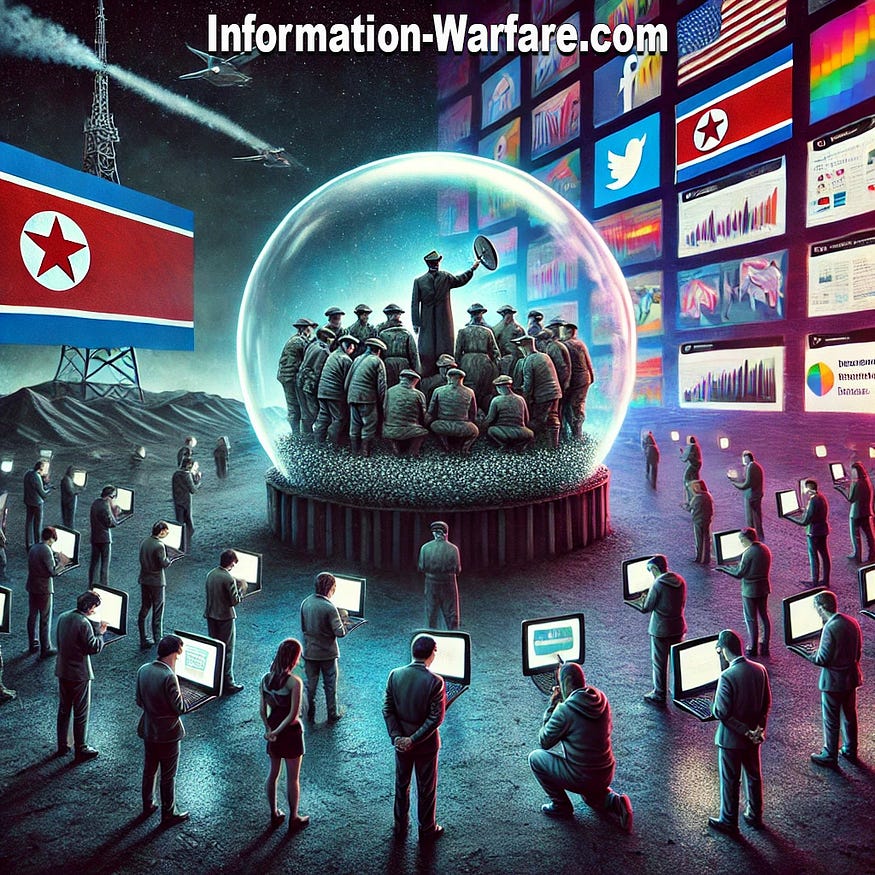A Warning for Democratic Nations
The Danger of Media Echo Chambers

Introduction:
In democratic societies, freedom of speech and the press are fundamental rights that underpin the very essence of democracy. However, these freedoms come with a responsibility: the need for media consumers to discern between news and opinion, between fact and propaganda.
Media companies like Fox News and Newsmax have the legal right to broadcast their content, including shows that blend news reporting with opinion, because it is generally expected that audiences understand the difference. However, this assumption becomes problematic when large segments of the population consume such content as their primary, or even exclusive, source of information, blurring the lines between informed discourse and partisan rhetoric.
The Media Bubble: A North Korean Comparison
To understand the risks of such media consumption patterns, we can look at a more extreme example: North Korea. In North Korea, the government controls all media, ensuring that citizens are exposed only to state-approved narratives. This creates a media bubble where alternative viewpoints are non-existent, and the population is effectively brainwashed into believing in the infallibility of their leaders and the righteousness of their cause. The result is a society that is isolated, misinformed, and unable to critically assess the world around them.
While the situation in democratic countries like the United States is far less severe, the rise of hyper-partisan news outlets and the increasing prevalence of echo chambers pose a similar, though subtler, threat. In these echo chambers, audiences are fed a steady diet of information that reinforces their pre-existing beliefs, often presented by hosts and pundits who are paid handsomely to deliver a particular ideological message. This can lead to a distorted view of reality, where facts are secondary to narratives, and where dissenting opinions are dismissed or outright ignored.
The Role of Media Companies: Rights and Responsibilities
Media companies like Fox News and Newsmax operate within their rights when they present content that mixes news with opinion. In fact, such programming has become a staple of modern media, where personalities like Tucker Carlson and Sean Hannity are not just journalists but also entertainers and influencers. Their shows are designed to engage viewers, often by presenting a clear and consistent ideological perspective. However, the danger arises when these opinion-based programs are perceived as objective news sources, particularly by audiences who consume little else.
This phenomenon is not unique to right-wing media. Across the political spectrum, media outlets tailor their content to appeal to specific demographics, creating a fragmented media landscape where individuals can easily find “news” that aligns with their biases. But when this type of content becomes the primary source of information, the audience is effectively trapped in a media bubble, similar to the citizens of North Korea, albeit by choice rather than force.
The Consequences: Polarization and Misinformation
The consequences of such media consumption patterns are evident in the increasing polarization of democratic societies. When people are exposed only to information that reinforces their beliefs, they become more entrenched in their views and less open to alternative perspectives. This not only deepens divisions within society but also erodes trust in institutions and the media itself. Over time, this can lead to a reality where misinformation is accepted as fact, and critical thinking is diminished.
The situation is exacerbated by social media algorithms that prioritize engagement over accuracy, further amplifying the echo chamber effect. As a result, many people in democratic societies find themselves in a situation not entirely unlike that of North Koreans: surrounded by a narrow, distorted version of reality, with little exposure to alternative viewpoints.
Conclusion: A Call for Media Literacy and Critical Thinking
The comparison to North Korea is a stark reminder of the dangers that arise when media consumption becomes insular and uncritical. While the mechanisms differ — government control in North Korea versus voluntary consumption in democratic societies — the outcome can be alarmingly similar: a population that is misinformed, divided, and vulnerable to manipulation.
To protect the integrity of our democratic societies, it is essential that citizens develop media literacy skills and actively seek out diverse perspectives. Media companies, for their part, must be transparent about the distinction between news and opinion and strive to uphold the highest standards of journalistic integrity. By fostering a more informed and engaged citizenry, we can resist the dangers of media bubbles and echo chambers and ensure that our societies remain vibrant, free, and democratic.
This is not just a call to action but a warning: if we fail to address these issues, the line between democratic and authoritarian media environments may become increasingly blurred.

